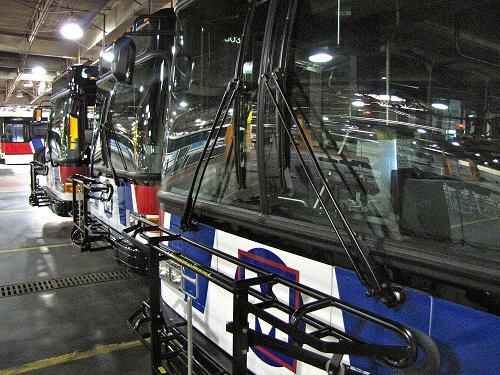It's a sign of the recession, but also symptomatic of a longstanding restriction on federal transit funding. In Lorain, Ohio and Albany, New York and other cities across the country, rows of brand new buses, paid for with stimulus money, have been laid up in garages.

Despite falling revenues, these recession-battered transit agencies might be able to return some of those buses to service if they had more flexibility to decide how they spend federal funds.
For years, transit advocates have been lobbying for greater local control over transit funding that flows from Washington. And it looks like now -- while demand for transit is high but local budgets are tight -- momentum is building to give local agencies the flexibility they need.
Rep. Russ Carnahan (D-MO), working with Ohio Republican Steve LaTourette, has introduced a bill that would help put more buses on the streets. While federal funds are often restricted to capital projects, Carnahan's bill would allow transit agencies, during times of crisis, to use some of that money for operating expenses, like paying bus drivers.
The bill would allow local agencies to expand service, or at least minimize cuts, at a time when more and more people are coming to depend on transit. And it would not increase federal expenditures in the process.
"Folks across the country rely on public transit to get to work and businesses rely on those services to get their employees to them," said Carnahan. "But we're forcing transit agencies to lay off workers even when funds are available."
Similar bills have been introduced since the bottom dropped out of the economy in 2008, but this time around the proposal appears to have bipartisan support. The Local Flexibility for Transit Assistance Act has 89 sponsors from both political parties, and Carnahan expects more to join shortly. After all, the bill decentralizes decision-making and doesn’t cost anything – popular themes among Republicans.
"We have some good, like-minded people on both sides of the aisle working on this issue," Carnahan said. "It’s only common sense to allow local officials to decide how transit dollars will best be spent in their areas."
Mary McCahon, a spokesperson with the Greater Cleveland Regional Transit Agency, welcomed the news. She said it's always been difficult for the agency to explain to riders why service reductions are necessary, especially after the agency receives a federal grant for a specific project.
Despite serving a large transit-dependent population, GCRTA was forced to raise fares in 2009 and cut service by 12 percent in 2010. The agency relies heavily on a county income tax to support service. But as soon as the recession began, those receipts plummeted.
"When we saw that drop, we needed to be more reliant on federal dollars, but those are not always available for operating," McCahon said "That’s what caused the fare increases and the cutbacks and the layoffs."
McCahon said GCRTA would benefit from Rep. Carnahan's bill if it moves forward.
"It’s definitely something positive," she said. "Right now, we need more operating funds."
McCahon's approval was echoed by a broad spectrum of leading national transit advocacy groups.
Scott Bogren of the Community Transit Association of America said the bill has the potential to help interrupt the vicious cycle many transit agencies face when they are forced to raise costs and reduce service -- and they see ridership fall as a result.
"Congressman Carnahan and the co-sponsors of this bill have hit the nail on the head," said Sarah Kline of Reconnecting America. "At this time when hardworking Americans need transit services more than ever before, this bill will help to ensure that people in cities both large and small will be able to get where they need to go."





